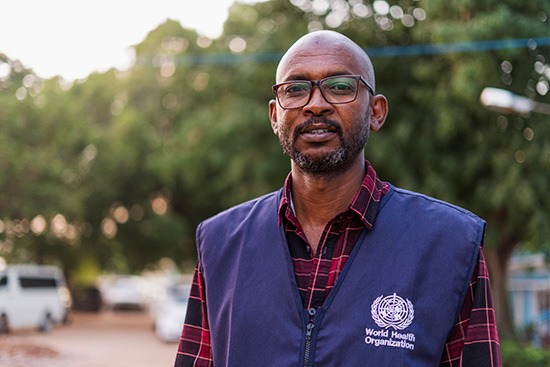
3 months of conflict in Sudan: meet Dr Nader Makki, WHO expert responding to the crisis
Dr Nader Makki, a Sudanese doctor, is one of WHO’s public health experts who has stayed in Sudan to deliver critically needed support, at a time when remaining was a clear threat to life. Dr Nader is an emergency officer at WHO’s Country Office in Sudan. He is currently coordinating the WHO emergency response in Gezira, leading on supplies distribution and providing technical support to the National Public Health Emergency Operations Centre (PHEOC), as well as supporting Gezira state to coordinate the state emergency response.
When violence erupted in Khartoum 3 months ago, Dr Nader voluntarily supported the evacuation of 3 of his international colleagues and 1 national colleague out of hot-spot areas in Khartoum, where they were stranded. He used his private vehicle and employed strong negotiation skills to overcome the challenges at several checkpoints. He relocated his family to a safe location in Sudan, and then travelled to Gezira to coordinate health partners for the health response to the crisis and to set up the WHO hub in Gezira. He felt compelled to put his public health expertise and humanitarian experience to use – accumulated over 18 years of working in humanitarian settings, including in places such as Darfur, Somalia and Yemen.
Q: How was the situation when you first came to Gezira state to lead WHO operations there?
A: I first arrived in Gezira during Eid al-Fitr holidays. I did not know anyone there, so I spent the first night at the public transport station.
Once I found a place to stay, and properly settled in, I reached out to the Director General of Health for Gezira and to colleagues in the United Nations system, the State Ministry of Health and other partner organizations, in an effort to coordinate the health response from Gezira state.
Q: What are the most crucial health needs in Sudan since the outbreak of fighting?
A: The most pressing health needs or gaps are the inaccessibility of medicines, particularly for those with chronic illnesses and for children with ailments that require specialized intervention. On top of the scarcity of supplies, there is the shortage of cash due delayed salaries and the closure of banks.
Q: What is WHO doing to respond to these needs?
A: WHO coordinates with partners to map the available resources, including medicines and diagnostic supplies, and compare availability with the assessed needs, and raise the concern about gaps.
Dispatch of WHO supplies is then made to the State Ministry of Health, international nongovernmental organizations and to the different locations that we serve from our hub in Al Madani, Gezira, including health facilities in North Kordofan and Khartoum.
Q: What are the main challenges you currently face to deliver WHO support to the system?
A: We are now in the fourth month since the fighting broke out in Sudan. We are close to a 100 days to be exact. Together with colleagues and partners, I have been working tirelessly to ensure medical supplies are available to the places where they are urgently needed, the health response is coordinated, and duplication of efforts is avoided.
However, insecurity, internet connectivity and lack of fuel are challenges I have to deal with constantly. Insecurity and access to fuel limits my free movement between states to provide the necessary support to my colleagues in the government health system, and to deliver supplies in a timely manner. Internet connectivity is a challenge to accessing data and documents for my work, and sometimes causes delays in updating my superiors in other parts of Sudan and at the WHO Regional Office in Cairo, Egypt.
Also on a personal level, I am not in touch with my family as frequently as I would like to be, due to these challenges. I miss my family. I miss my old, normal life.
Q: How do you feel about this important role you are playing to alleviate the health challenges of the Sudanese people?
A: At a time when we were all concerned for our safety and were uncertain of each new day, I think I succeeded in bringing all actors together to support each other and deliver health service support, so we can meet the health needs of the people of Sudan.
As a Sudanese person myself, I would like to thank WHO and colleagues from other agencies for the role they are playing to support my people during this critical period.

